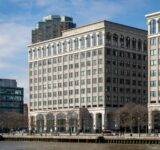Russell Hall at Fort Monmouth — Courtesy: Fort Monmouth Economic Revitalization Authority
By Joshua Burd
After four years of redevelopment efforts that focused on only half of the sprawling Fort Monmouth property, a state authority has acquired the remaining 560 acres from the U.S. Army, allowing it to move ahead with projects that are slated for the balance of the site.
The Fort Monmouth Economic Revitalization Authority said Thursday that it had purchased the remaining acreage for $33 million, calling it a “historic milestone” for the shuttered base and the Monmouth County region. The authority now has control of the entire site, which spans more than 1,100 acres and includes sections of Eatontown, Oceanport and Tinton Falls.
The base closed in 2011 under a nationwide realignment of military installations. The following year, the state obtained about half of the property through a memorandum of agreement with the Army, leading to redevelopment projects such as a new headquarters for a global technology company and a new health care facility at the site of a former Army clinic.
The authority, or FMERA, purchased the balance of the site through two series of notes issued by the Monmouth County Improvement Authority, according to a news release. With the transfer of the second half of the property, FMERA said it can now close on executed contracts for three buildings and accelerate the closings of six other pending projects.
The authority’s executive director, Bruce Steadman, said there are “several companies that are anxious to start redeveloping (the site) and the closing with the Army brings them closer to putting shovels in the ground.”
Other state officials hailed the closing at the historic property.
“For generations, Fort Monmouth stood as a bastion of economic activity in Monmouth County, Lt. Gov. Kim Guadagno said in a prepared statement Thursday. “The redevelopment underway has already brought investment and employment opportunities back to the Fort, and FMERA’s purchase of the remainder of the property is the next step in restoring the area as the hub of innovation that it once was.”
Fort Monmouth was the Army’s hub for developing communications technology, intelligence and reconnaissance services for more than 90 years, the news release said. After a cash-strapped Defense Department announced plans to shut down the base, Gov. Chris Christie signed a law in 2010 that paved the way for a large-scale adaptive reuse.
But the state’s efforts have taken longer than stakeholders would like, due in part to the complexities of coordinating with the federal government.
Still, some pieces of the property have seen major progress. Commvault, a telecom company focused on enterprise backup and cloud services, recently opened the first phase of a planned 650,000-square-foot world headquarters in the Tinton Falls section of the base.
The $100 million, ground-up project was the largest investment to date at the Fort property, bringing more than 900 employees to the complex. FMERA also noted that AcuteCare Health Systems purchased the former Patterson Army Health Clinic in Oceanport, giving way to a multimillion-dollar renovation to create a modern 98,000-square-foot health care facility.
The authority has been marketing the second half of the property since before Thursday’s transfer, thanks to what it says is strong interest for development opportunities in the county. Plans for the remaining half could include a mix of uses, including residential, retail, office, research and open space.
All told, FMERA said it hopes to complete a redevelopment plan in the next 10 years, while creating up to 10,000 jobs and building out more than $1.5 billion worth of real estate.
“Since its inception, FMERA has aimed to spur economic development and job creation, and to revitalize the region after Fort Monmouth was shuttered in 2011,” FMERA Chairman James V. Gorman said. “With the purchase of the Phase 2 properties, and while working with the county freeholders and the mayors of the three boroughs, FMERA will accelerate its proactive approach to attracting developers to Fort Monmouth and bringing more jobs back to Monmouth County.”










